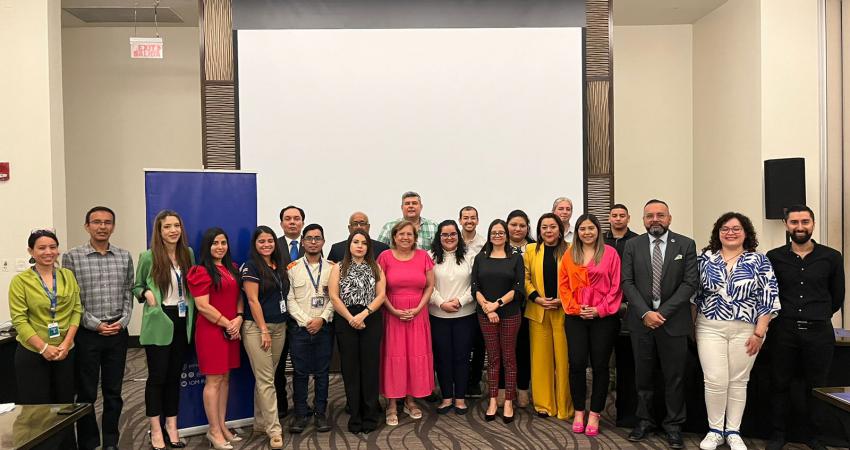IOM strengthens capacities of governments in the region to manage crises and disasters caused by climate change

San Jose - May 18, 2023. IOM, in partnership with the Coordination Center for Disaster Prevention in Central America and the Dominican Republic (CEPREDENAC), developed the first generation of the course "Comprehensive Approach to Migration in Crisis Situations and Migration due to Climate Change". The course was attended by 22 people involved in risk management and climate change at governmental level in Mexico, Central America and the Dominican Republic, as well as officials from the Central American Integration System (SICA). The activity and was held on May 16, 17 and 18 in Panama City.
Mexico, Central America and the Dominican Republic are regions with large socioeconomic disparities, significant migratory flows, as well as environmental risks associated with climate change. That is why, in its regional strategy, the International Organization for Migration (IOM) establishes as a priority to strengthen disaster preparedness, reduce the risk of displacement and respond to crises. In this context, the aim was to strengthen the technical capacities of the participants of the III Regional Humanitarian Assistance Simulation 2023. The sessions included various topics on displacement for environmental reasons, such as protection and vulnerabilities of migrants in the context of crises and emergencies, and the implementation of international guidelines on the subject.
As a follow-up to this activity, IOM, through the Western Hemisphere Program, is expected to develop a strategy to influence the dissemination and approval of the model law on displacement due to climate change in the region, which will be finalized by the Forum of Presidents of Legislative Bodies of Central America and the Caribbean Basin (FOPREL for its name in Spanish). In addition, the issue of humanitarian visas for environmental reasons in SICA member countries will be followed up on thanks to joint work with the Central American Commission of Migration Directors (OCAM) and CEPREDENAC, as recently discussed at the RCM (Regional Conference on Migration) workshop on migration and climate change.
"For IOM it is important to provide training and tools to promote migration management in the region takes into account the significance of environmental factors, disasters and climate change on human mobility. These factors must be integrated into all areas of migration management, such as prevention, preparedness and response to displacement, border management and others, and it is hoped that the region will soon have a model law on the subject," said Andrea Dabizzi, Regional Coordinator of the Western Hemisphere Program.
These efforts respond directly to the Sustainable Development Goals (SDGs), specifically to achieving target 13.1 to "Strengthen resilience and adaptive capacity to climate-related risks and natural disasters in all countries," as well as target 13.2 to "Mainstream climate change measures into national policies, strategies and plans." They also relate directly to goals 2, 7 and 23 of the Global Compact on Migration and the Declaration of the Angels by promoting regional cooperation, protection of rights, awareness raising and training, and policy harmonization.
This activity was carried out with the support of the Bureau of Population, Refugees and Migration of the U.S. Department of State. For more information, contact Efrain Guerrero, technical specialist in migration and crisis at eguerrero@iom.int.